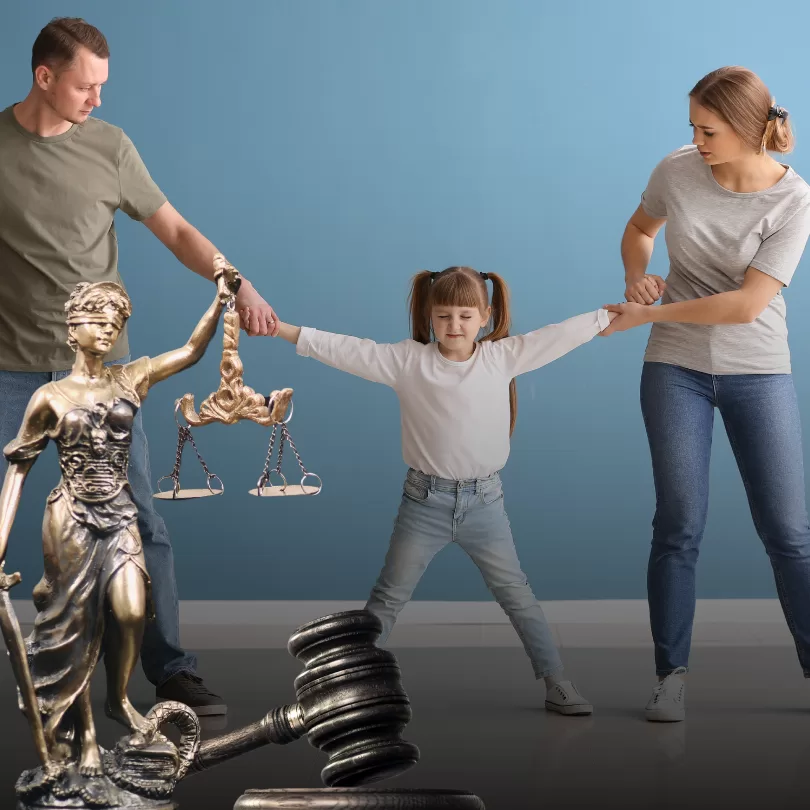Maryland Custody Battles and Visitation Rights
Going through a separation or divorce can be tough for everyone involved, especially for children affected by the changes it brings. We will shed light on crucial aspects that may cause difficulties in the custody process. You’ll gain insights into the factors that might be used against you in a custody battle and your visitation rights as a custodial parent. Additionally, we will discuss how you can protect your child’s well-being by understanding when visitation can be denied to the non-custodial parent in Maryland.
What can be used against you in a custody battle in Maryland?
In a custody battle in Maryland, the court will consider the “best interests of the child” standard when deciding. This means that the court will look at various factors to determine the best living arrangement for the child. Some of the factors that the court may consider include:
- The child’s physical and emotional health
- The child’s educational needs
- The child’s emotional ties to each parent
- The parent’s capacity to offer a secure and consistent living environment
- The parents’ parenting skills
- The parents’ history of violence or abuse
- The parent’s willingness to cooperate
Factors That Can Negatively Impact Your Custody Case
Anything that could negatively impact the child’s best interests could be used against you in a custody battle. This could include things like:
- A history of domestic violence. If you have a history of domestic violence, the court will likely consider this a significant factor in determining custody. The court will want to ensure the child is not exposed to violence or abuse.
- A history of substance abuse. If you have a history of substance abuse, the court will want to know if you are currently sober and have taken steps to address your addiction. The court will also want to know if substance abuse has ever impacted your parenting ability.
- A criminal record. If you have a criminal record, the court will want to know the nature of the offenses and the impact on your ability to parent. For example, if you have a history of violent crimes, the court will likely be concerned about your ability to provide a safe and stable home for the child.
- A history of neglect or abandonment. If you have a history of neglect or abandonment, the court will likely consider this a significant factor in determining custody. The court will want to ensure the child is not at risk of being neglected or abandoned.
- A history of interfering with the other parent’s relationship with the child. If you have a history of interfering with the other parent’s relationship with the child, the court will likely consider this a significant factor in determining custody. The court will want to ensure the child has a meaningful relationship with both parents.
Additional Considerations
If you are involved in custody, it is important to know the factors the court will consider. You should also be mindful of anything in your past that could be used against you. You should speak to a family attorney near Maryland if you have any concerns.
Here are some additional things to keep in mind:
- The court will not consider your past mistakes if you have taken steps to address them. For example, if you have a history of substance abuse but have been sober for several years, the court will not hold that against you.
- The court will consider the child’s desires, and if the child is mature enough to communicate their preferences, the court will give considerable importance to those wishes.
- The court’s decision is not final. You can appeal it if you are unhappy with the court’s decision.
Addressing Past Mistakes
If you are involved in custody, it is important to know the factors the court will consider. You should also be mindful of anything in your past that could be used against you. You should speak to a family attorney near Maryland if you have any concerns.
Here are some additional things to keep in mind:
- The court will not consider your past mistakes if you have taken steps to address them. For example, if you have a history of substance abuse but have been sober for several years, the court will not hold that against you.
- The court will consider the child’s desires, and if the child is mature enough to communicate their preferences, the court will give considerable importance to those wishes.
- The court’s decision is not final. You can appeal it if you are unhappy with the court’s decision.
It is important to note that the court will not automatically deny you custody if you have any of the above-mentioned factors. The court will consider all the factors involved in your case and decide based on the child’s best interests.
When can you deny visitation to a non-custodial parent in Maryland?
In most child custody cases, you cannot deny visitation to the non-custodial parent without a court order. The court will only deny visitation if it believes that it is in the best interests of the child. Some of the reasons why the court might deny visitation include:
- If the non-custodial parent has a history of abuse or neglect, the court may order supervised visitation. This means that the non-custodial parent will only be allowed to see the child in the presence of a third party, such as a therapist or social worker.
- If the non-custodial parent is a danger to the child’s physical or emotional well-being, the court may order no visitation. This means that the child will not be allowed to see the non-custodial parent under any circumstances.
- If the non-custodial parent has a history of interfering with the custodial parent’s relationship with the child, the court may order supervised visitation or no visitation.
- If the non-custodial parent has not paid child support, the court may order visitation only if the non-custodial parent begins paying child support.
- If the child does not want to see the non-custodial parent, the court may order no visitation. However, the court will not automatically deny visitation based on the child’s wishes if the child is too young to understand the consequences of the decision.
This is also primarily for custodial parents’ reasons to deny overnight visitation in Maryland. If you ask if a legal guardian can deny visitation, then it’s yes, a legal guardian can deny visitation in custody. However, It is important to note that the court will not automatically deny visitation even if the non-custodial parent has a history of abuse or neglect.
Visitation rights for non-custodial parents in Maryland?
- The child’s age and maturity
- The child’s relationship with both parents
- The parents’ parenting skills
- The parent’s willingness to cooperate
- The parents’ history of violence or abuse
If the court decides that visitation is in the child’s best interests, they will order a visitation schedule. The visitation schedule will specify how often and for how long the non-custodial parent will have visitation rights with the child.
Here are some additional things to keep in mind about what is reasonable visitation rights for non-custodial parents:
- The court will consider the child’s best interests when deciding visitation.
- The court may also consider the parents’ wishes. However, the court’s decision will ultimately be based on what is in the child’s best interests.
- The court can modify the visitation schedule at any time if they believe it is in the child’s best interests.
Can a custodial parent deny visitation in Maryland?
A custodial parent cannot deny visitation to the non-custodial parent without a court order or a compelling reason to withhold visitation. The non-custodial parent has a legal right to see their child. However, there are some exceptions to this rule.
Valid reasons to deny visitation include:
- They fear the other parent will use the visitation to harm the child.
- They believe that the other parent is not good and that they shouldn’t be involved in the child’s life.
- They are angry with the other parent and are trying to punish them.
- They believe that the visitation is not in the child’s best interests.
If you are a custodial parent, you can deny visitation if there is no court order, but the non-custodial parent can file a motion to enforce the visitation order. The court will then decide whether the custodial parent has a valid reason for denying visitation. If the court finds that the custodial parent has no valid reason, they may order the custodial parent to allow visitation.
Consequences for denying visitation rights in a custody battle in Maryland
The consequences of denying visitation in custody can vary depending on the case’s specific circumstances. However, some of the potential consequences include:
- Being held in contempt of court. This serious offense can result in fines, jail time, or both.
- Losing custody of the child. If the court finds that the custodial parent denies visitation without a valid reason, they may award custody of the child to the non-custodial parent.
- Having to pay child support. If the custodial parent loses custody of the child, the court may order them to pay child support to the non-custodial parent.
- Having a negative impact on the child’s relationship with the other parent. If the child is denied visitation with the other parent, it can damage their relationship. This can result in enduring adverse effects on the child.
Tips for Maryland Custody Battles
Here are some custody battle tips in Maryland:
Get a lawyer. This is the most important thing you can do. A lawyer will know the law and can help you navigate the legal system. They can also represent you in court and advocate for your child’s best interests.
Be prepared. Gather all of the evidence you can that supports your case. This includes school records, medical records, and letters from friends and family. You should also prepare to answer questions about your parenting skills and relationship with your child.
Be honest. The court will want to know the truth about your situation. Don’t try to hide anything, even if you think it will make you look bad.
Be cooperative if you can, and try to work with the other parent to reach an agreement out of court. This will save time and money and be better for your child.
Be respectful. Even if you’re angry with the other parent, it’s important to be respectful in court. This will show the judge that you’re mature and capable of putting your child’s needs first.
Divorce With A Plan Experience Family Attorney
At Divorce With a Plan, we understand the complexities of child custody disputes and visitation rights. Take the first step towards securing your child’s future by scheduling a free consultation with our experienced family law attorneys near you. Let us guide you through the process and protect your parental rights. Don’t wait; contact us today at (240) 269-3592 to ensure the best possible outcome for your family.






